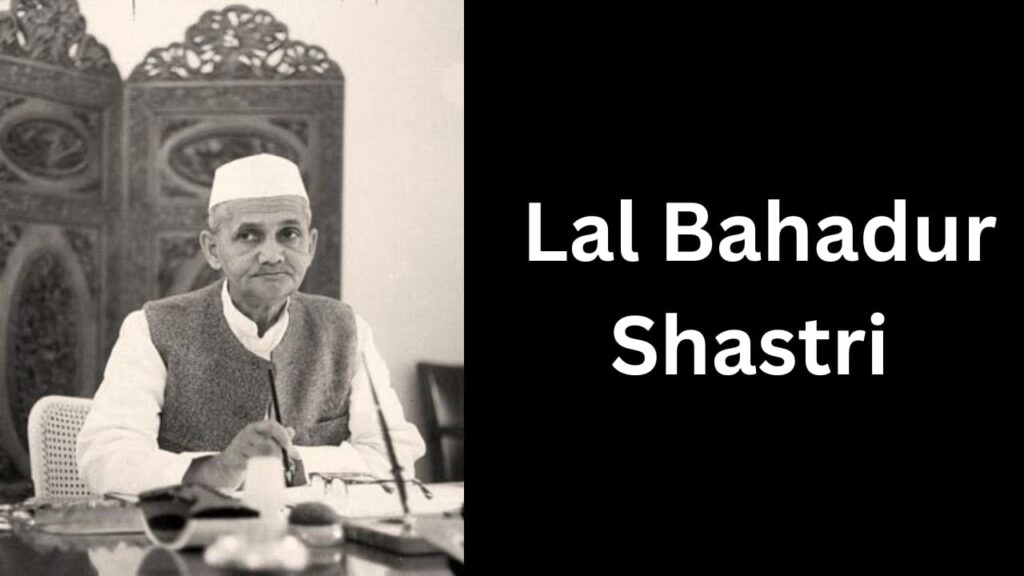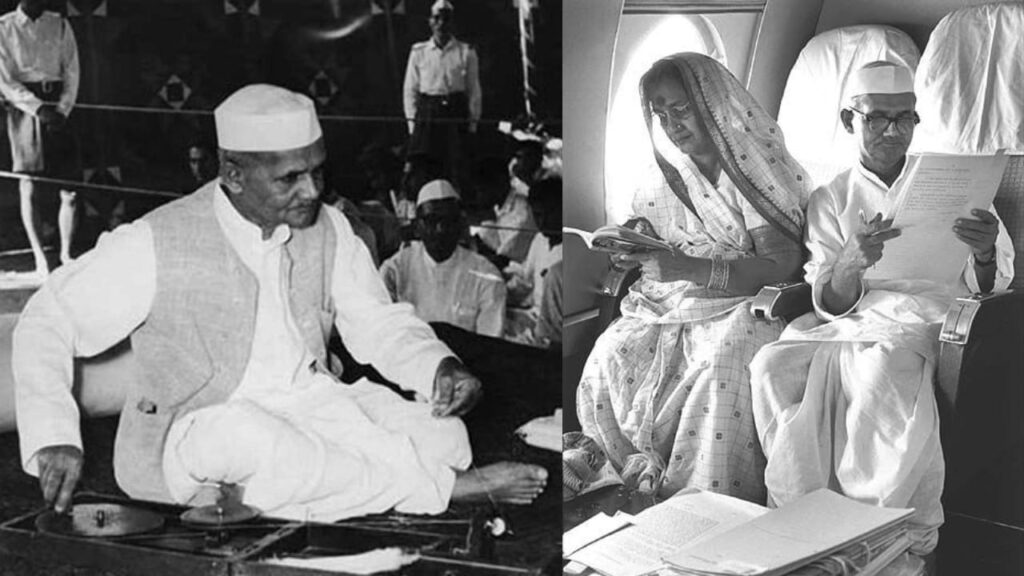Lal Bahadur Shastri

Early Life
Lal Bahadur Shastri was born on October 2, 1904, in Mughalsarai, Uttar Pradesh, India. His early life was marked by modesty and simplicity. Growing up in a family of limited means, he imbibed values of humility and hard work from a young age.
Education
Shastri’s thirst for knowledge led him to pursue higher education despite facing financial constraints. He graduated with distinction from Kashi Vidyapeeth in Varanasi and later earned a postgraduate degree in philosophy. His academic pursuits laid the foundation for his intellectual rigor and analytical thinking.
Role in the Indian Independence Movement
Inspired by the call for freedom, Shastri actively participated in the Indian independence movement. He joined the non-cooperation movement led by Mahatma Gandhi and became a staunch advocate for the cause of a free India.
Political Career

After India gained independence in 1947, Shastri’s political career began to soar. He held various ministerial positions, including the crucial role of Minister of Railways, where he demonstrated his administrative acumen and dedication to public service.
National and International Impact
As India’s Prime Minister from 1964 to 1966, Shastri left an indelible mark on the nation. His leadership during critical times, including the Indo-Pakistani War of 1965, showcased his unwavering commitment to safeguarding India’s interests and sovereignty.
Tashkent Agreement
One of the pivotal moments in Shastri’s tenure was the Tashkent Agreement of 1966. Under his statesmanship, India and Pakistan came to the negotiating table to resolve the conflict that had arisen during the war. The agreement was a testament to Shastri’s diplomatic finesse and commitment to peace.
Simplicity and Integrity
Lal Bahadur Shastri was known for his simplicity and integrity. He led by example, living a frugal lifestyle and earning the respect and admiration of the masses. His incorruptible nature remains an inspiration for leaders worldwide.
Sudden Demise
Tragically, Lal Bahadur Shastri’s life was cut short on January 11, 1966, in Tashkent, Uzbekistan, shortly after signing the peace agreement with Pakistan. His sudden demise was a profound loss to the nation.
Legacy
Despite the brevity of his tenure, Lal Bahadur Shastri’s legacy endures. He is remembered as a leader of exceptional integrity, whose actions spoke louder than words. His principles of simplicity, humility, and dedication to public service continue to inspire generations.
Honors and Commemorations
In recognition of his outstanding contributions, Shastri has been posthumously honored with several awards, including the Bharat Ratna, India’s highest civilian award. Numerous educational institutions, roads, and landmarks across the country bear his name, ensuring that his memory lives on.
Customer FAQs
Q: What was Lal Bahadur Shastri’s role in the Indo-Pakistani War of 1965?
A: As India’s Prime Minister during the war, Lal Bahadur Shastri provided steadfast leadership and inspired the nation with his call of “Jai Jawan, Jai Kisan” (Hail the Soldier, Hail the Farmer), emphasizing the need for both defense and agricultural strength.
Q: How did Lal Bahadur Shastri’s upbringing influence his political career?
A: Shastri’s humble upbringing instilled in him values of simplicity, integrity, and a deep sense of empathy for the common man. These qualities guided his political decisions and endeared him to the masses.
Q: Who was Lal Bahadur Shastri?
A: Lal Bahadur Shastri (1904-1966) was a prominent Indian statesman and the second Prime Minister of India. He played a crucial role in India’s political landscape and was known for his simplicity, integrity, and dedication to public service.
Q: What is the significance of the slogan “Jai Jawan, Jai Kisan” associated with Lal Bahadur Shastri?
A: “Jai Jawan, Jai Kisan” (Hail the Soldier, Hail the Farmer) was a slogan coined by Lal Bahadur Shastri during the Indo-Pakistani War of 1965. It emphasized the importance of both the defense forces and agricultural sector in ensuring the nation’s strength and security.
Q: What were Lal Bahadur Shastri’s major contributions to Indian politics?
A: Lal Bahadur Shastri made significant contributions to Indian politics, including his leadership during the Indo-Pakistani War of 1965, the Tashkent Agreement, and his emphasis on self-sufficiency in agriculture.
Q: What is the Tashkent Agreement and why is it important?
A: The Tashkent Agreement was a peace agreement signed in 1966 between India and Pakistan, brokered by the Soviet Premier, Alexei Kosygin, in Tashkent, Uzbekistan. It aimed to resolve the conflicts that arose during the Indo-Pakistani War of 1965. The agreement was instrumental in restoring diplomatic relations between the two nations.
Q: How did Lal Bahadur Shastri’s principles of simplicity influence his leadership style?
A: Lal Bahadur Shastri’s principles of simplicity were reflected in his lifestyle and leadership style. He led a modest life, free from extravagance, which endeared him to the common people. His approachable and down-to-earth demeanor made him a relatable figure.
Q: What were the key events during Lal Bahadur Shastri’s tenure as Prime Minister?
A: Some key events during Lal Bahadur Shastri’s tenure as Prime Minister include the Indo-Pakistani War of 1965, the signing of the Tashkent Agreement, and his efforts to promote self-sufficiency in food production.
Q: How did Lal Bahadur Shastri’s sudden demise impact India?
A: Lal Bahadur Shastri’s sudden demise in 1966 was a great loss to the nation. It left a void in Indian politics and marked the end of an era characterized by his strong and principled leadership.
Q: What are some of the honors and commemorations associated with Lal Bahadur Shastri?
A: Lal Bahadur Shastri was posthumously awarded the Bharat Ratna, India’s highest civilian award, in recognition of his exceptional contributions to the nation. Numerous educational institutions, roads, and landmarks across India are named in his honor.
